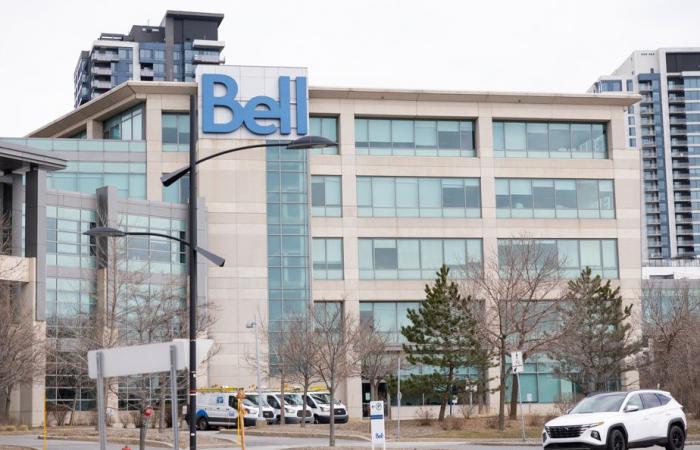The freezing of BCE’s dividend and the announcement of a breakthrough in the United States with the acquisition of a fiber optic internet access provider were received coldly on Monday by investors.
Posted at 8:14 a.m.
Updated at 3:06 p.m.
With the assumption of $2 billion in debt by the Montreal telecommunications giant, the value of the transaction surrounding the purchase of the private company Ziply Fiber rises to $7 billion.
An amount of 4.2 billion from the sale of BCE’s stake in Maple Leaf Sports & Entertainment (MLSE) will be used to finance the acquisition. Management assures that no additional debt is necessary.
In announcing the sale of its 37.5% stake in MLSE in September, BCE management said it intended to use the proceeds to reduce its debt level and focus on its main growth drivers to support its transformation of a telecoms company into a leader in technology services.
Ziply Fiber will add 1.3 million subscribers (residential and commercial) connected to optical fiber. Ziply Fiber’s primary operations are Oregon, Montana, Idaho and Washington.
In the midst of a transformation from a traditional telco to a technology-enabled services company, BCE says the transaction will strengthen Bell’s position as the third-largest fiber optic internet service provider in North America, with a total of 9 million locations connected to optical fiber, with a goal of reaching more than 12 million locations by the end of 2028.
As a result of the announced transaction, BCE is suspending dividend growth paid to its shareholders “until its distribution and net financial leverage ratios approach the target ranges established in its policies.”
BCE CEO Mirko Bibic was called upon to defend the proposed acquisition in a conference call on Monday.
PHOTO MARTIN TREMBLAY, LA PRESSE ARCHIVES
Le PDG de BCE, Mirko Bibic
Scotia analyst Maher Yaghi said he was trying to understand the transaction from a strategic point of view. “You leverage your balance sheet, you put in place a dividend reinvestment plan that will be dilutive to shareholders, and you cap the dividend for many years to expand into markets where you don’t offer wireless service to resell with optical fiber. It looks like this will have a dilutive effect on free cash flow for many years. »
Maher Yaghi added that BCE shareholders are looking for growth in dividends and free cash flow, not necessarily growth in revenue or operating profit. “Investors can get this in other sectors. Are you changing what BCE stands for? »
Mirko Bibic responded that BCE is focused on its core business, which is generating growth from fiber. “We allocate capital responsibly to implement a growth program without compromising total shareholder return. It’s really about reinvesting capital to build a stronger foundation for today and tomorrow. And it will be in an area that will clearly generate free cash flow growth over the long term. »
The BCE big boss insisted that it is important to lay the foundations for BCE’s continued success for decades to come. “Optical fiber is a long-life infrastructure asset. This bodes well for accelerated growth. We position the company for long-term growth in revenue, operating profit, and free cash flow. As responsible leaders, this is what we must do. We not only have to manage for the next quarter, but also for the next ten years. »
BCE shares lost 10% of their value on Monday on the Toronto Stock Exchange and reached their lowest level since 2012.
Analyst Vince Valentini of TD says he believes investors don’t like the fact that debt levels will no longer be reduced with proceeds from the sale of the MLSE stake.
Well aware of the market reaction, Mirko Bibic indicated in an interview that the announced decision was not taken to manage one day. “The acquisition is an example demonstrating that a Quebec flagship is penetrating the American market and pursuing an ambitious growth strategy. We do it in a segment that we know well. Fiber optic is the best high speed internet technology in the world. Customers prefer fiber to cable and it’s the same in the United States. »
Mirko Bibic emphasizes that the growth in the number of subscribers at Ziply is impressive (15% over the past 12 months). “And we expect it to accelerate,” he said.
At Desjardins, analyst Jérôme Dubreuil cannot help but see a negative signal regarding the prospects in the Canadian telecommunications industry, “the big three having diverted a large part of their recent investments from the sector,” says -he.
Montreal portfolio manager Philippe Hynes, of the firm Tonus Capital, emphasizes for his part that an expansion in the United States would not be what he wants for BCE “because it is difficult and the market is more competitive.”
“I don’t know what their competitive advantage will be,” he says. “They had just cleaned up their balance sheet. Well, that didn’t last long! »
Ziply Fiber is a private company owned by Searchlight Capital and WaveDivision Capital, among others.
BCE will present its most recent quarterly financial performance on Thursday.







